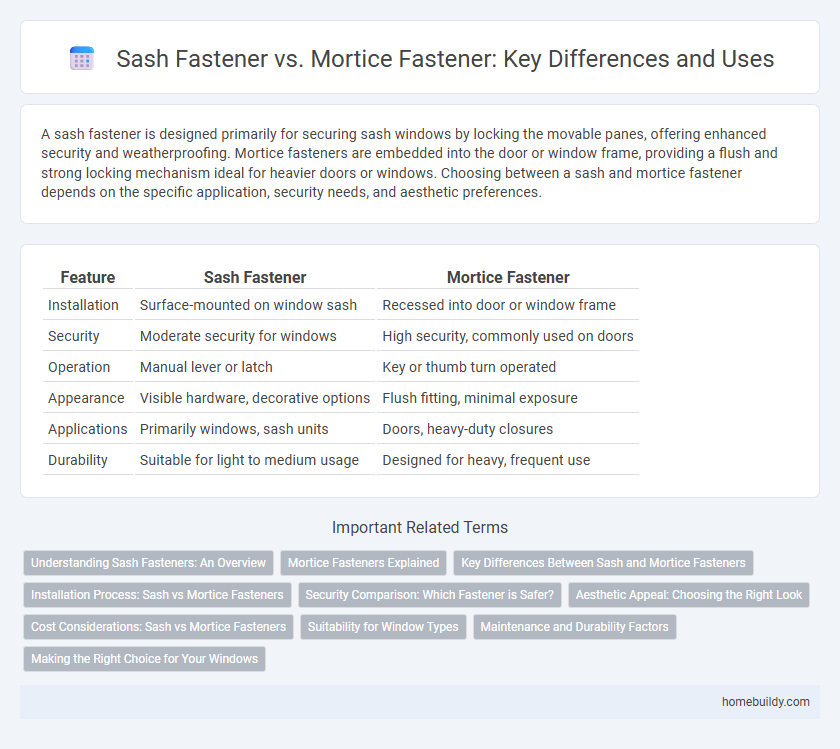A sash fastener is designed primarily for securing sash windows by locking the movable panes, offering enhanced security and weatherproofing. Mortice fasteners are embedded into the door or window frame, providing a flush and strong locking mechanism ideal for heavier doors or windows. Choosing between a sash and mortice fastener depends on the specific application, security needs, and aesthetic preferences.
Table of Comparison
| Feature | Sash Fastener | Mortice Fastener |
|---|---|---|
| Installation | Surface-mounted on window sash | Recessed into door or window frame |
| Security | Moderate security for windows | High security, commonly used on doors |
| Operation | Manual lever or latch | Key or thumb turn operated |
| Appearance | Visible hardware, decorative options | Flush fitting, minimal exposure |
| Applications | Primarily windows, sash units | Doors, heavy-duty closures |
| Durability | Suitable for light to medium usage | Designed for heavy, frequent use |
Understanding Sash Fasteners: An Overview
Sash fasteners are specifically designed to secure sash windows by locking the movable sashes together, providing improved security and ease of operation compared to mortice fasteners. Unlike mortice fasteners, which embed into the window frame and require more complex installation, sash fasteners are surface-mounted, making them easier to install and maintain. Their ergonomic design and compatibility with traditional sash window styles make sash fasteners a preferred choice for preserving aesthetic appeal while enhancing functionality.
Mortice Fasteners Explained
Mortice fasteners are recessed into the sash frame, providing a flush and discreet closure compared to sash fasteners which sit on the surface. These fasteners enhance security by embedding the locking mechanism within the frame, reducing vulnerability to forced entry. Their concealed design also contributes to a cleaner aesthetic while maintaining robust functionality in window and door applications.
Key Differences Between Sash and Mortice Fasteners
Sash fasteners secure window sashes by tightening and locking the movable parts together, providing a tight seal and enhanced security, whereas mortice fasteners are typically embedded into the door or window frame for a flush finish and robust locking mechanism. Unlike sash fasteners, which are surface-mounted and visible, mortice fasteners require precise installation within a mortice cut, offering a more concealed but complex fitting. The choice between these fasteners depends on the desired aesthetic, security level, and ease of installation.
Installation Process: Sash vs Mortice Fasteners
Sash fasteners are surface-mounted, requiring basic tools like a screwdriver for straightforward installation on window frames, making them ideal for DIY projects. Mortice fasteners demand precise recess cutting into the sash or frame using chisels or routers, resulting in a more complex and time-consuming installation process that often necessitates professional skills. The surface-fitted nature of sash fasteners simplifies alignment and adjustment, whereas mortice fasteners provide a flush finish but require meticulous measurement and fitting.
Security Comparison: Which Fastener is Safer?
Sash fasteners offer moderate security, ideal for restricting window movement but less resistant to forced entry compared to mortice fasteners. Mortice fasteners are embedded within the window frame, providing enhanced strength and superior resistance against tampering and break-ins. For high-security applications, mortice fasteners are the safer option due to their robust locking mechanisms and concealed installation.
Aesthetic Appeal: Choosing the Right Look
Sash fasteners offer a traditional and elegant aesthetic that complements classic window designs, featuring decorative handles and exposed hardware for visual interest. Mortice fasteners provide a sleek and minimalist appearance by being recessed into the window frame, ideal for modern and contemporary styles. Selecting between these fasteners depends on whether the priority is ornamental detail or a clean, unobtrusive finish.
Cost Considerations: Sash vs Mortice Fasteners
Sash fasteners generally offer a lower initial cost compared to mortice fasteners due to simpler installation and fewer components. Mortice fasteners, while more expensive upfront, provide enhanced security and durability, potentially reducing long-term maintenance expenses. Evaluating budget constraints and security needs is essential when choosing between these two fastener types.
Suitability for Window Types
Sash fasteners are specifically designed for timber sash windows, providing secure locking without compromising the window's aesthetic or operation. Mortice fasteners suit a wider range of window types, including casement and timber frames, offering enhanced strength through their embedded mechanism. Choosing between sash and mortice fasteners depends on window design, with sash fasteners ideal for slim, vertical sliding sashes, while mortice fasteners better support heavier or outward-opening windows.
Maintenance and Durability Factors
Sash fasteners generally require less maintenance than mortice fasteners due to their external positioning, which allows for easier cleaning and lubrication. Mortice fasteners, embedded within the door or window frame, tend to accumulate dust and debris, potentially affecting their long-term durability. Both types benefit from regular inspection, but sash fasteners often demonstrate better longevity in environments prone to dirt and moisture.
Making the Right Choice for Your Windows
Choosing between sash fasteners and mortice fasteners depends on your window type and security needs. Sash fasteners are ideal for traditional timber sash windows, offering easy operation and discreet design, while mortice fasteners provide a robust locking mechanism fitted into the window frame for enhanced security. Consider ease of installation, durability, and aesthetic compatibility when making the right choice for your windows.
Sash fastener vs Mortice fastener Infographic

 homebuildy.com
homebuildy.com